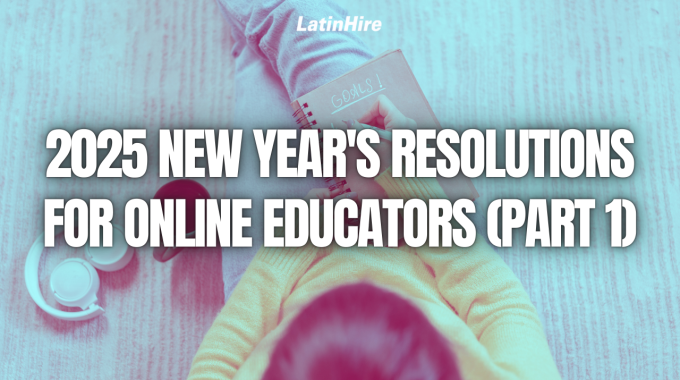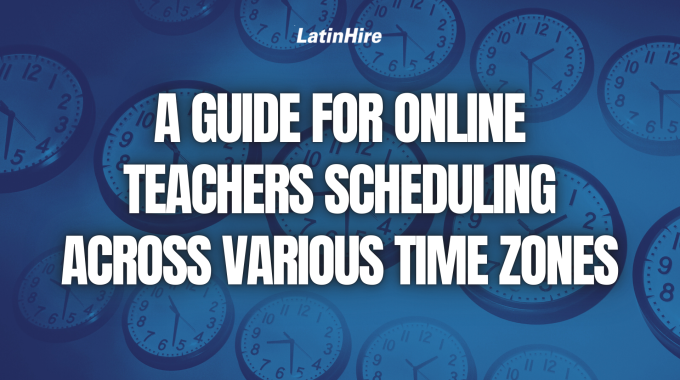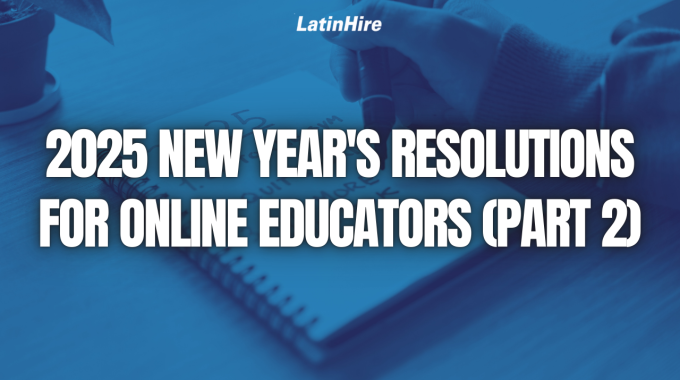Yesterday (March 9, 2025) marked the start of daylight saving time (DST)—a potential headache for…

2025 New Year’s Resolutions for Online Educators (Part 1)
As we kick off 2025, it’s the perfect time to set meaningful goals that can enhance your teaching experience, positively impact your students, and improve your day-to-day life.
Whether it’s refining your teaching methods, fostering stronger relationships, or taking better care of yourself, there’s always room for growth. Remember, it’s better to focus on 1-5 achievable goals than to overwhelm yourself with too many aspirations and achieve none.
Here are eight resolutions for online educators to consider for the year ahead. Choose a few you’d like to work on or create your own list!
1) Incorporate a new teaching strategy in your online classroom.

Experimenting with new teaching strategies can be a breath of fresh air in your online classes, for both you and your students. With a lack of face-to-face interactions in the virtual realm, trying different teaching methods can keep the class interesting. Consider trying techniques like flipping the classroom or gamification to engage students in innovative ways.
Reflect on your current teaching practices and identify areas where a new approach could enhance student participation and understanding. Even small changes, like integrating more technology or group work, can have a profound impact on student learning.
2) Get more creative with your assessments.
Move beyond traditional tests and essays by exploring alternative assessments such as portfolios, peer evaluations, or creative projects. These can give students more opportunities to demonstrate their skills and understanding.
Consider using assessments that align with real-world applications, such as presentations, case studies, or interactive demonstrations. By diversifying your assessment types, you cater to different learning styles and can better prepare students for their professional lives in the future.
3) Introduce more engaging activities in class.
Activities like debates, simulations, and hands-on (or online) experiments can make learning more interactive. Look for opportunities to incorporate fun and meaningful experiences that resonate with your students’ interests.
Engagement not only boosts participation but also helps students retain information more effectively. Even having a simple points system to track student progress or hosting team competitions can motivate students to actively participate.
4) Develop stronger relationships with your students.

Building trust and rapport with your students can lead to a more supportive and productive classroom environment. In online classes, it’s especially hard to develop meaningful connections, so take time to learn about your students’ interests, listen to their concerns, and show genuine care for their success.
Schedule regular one-on-one check-ins, celebrate their achievements, and create an inclusive virtual space where everyone feels heard and valued. A strong teacher-student connection can improve both academic performance and classroom behaviour.
5) Stay up-to-date on the latest trends in your subject.
The world is constantly evolving, so staying informed about new developments in your field can enhance your teaching. Subscribe to relevant journals, attend webinars, and join online communities to stay ahead of the game.
Whether it’s learning about emerging trends, cutting-edge research, or innovative teaching tools, staying current ensures your lessons remain relevant and interesting for students. This will also show students the practicality of the subject matter they’re learning.
6) Prioritize self-care.
Online teaching is demanding and often blurs the line between work and personal life. Self-care is essential to avoid burnout. Schedule time for rest, hobbies, and activities that recharge your energy and bring you joy. If you have control over your class schedule, try to space out your classes and give yourself ample time to recharge after each teaching block.
Whether it’s setting boundaries for work-life balance, practicing mindfulness in the mornings, or participating in a team sport in the evenings, prioritizing your personal well-being allows you to show up in your best form for your students.
7) Organize your physical and digital space.
A clutter-free physical and digital workspace can improve focus and efficiency. Take time to declutter your desk space, organize your digital files, sort your emails, and establish systems to keep everything in order. This ensures that you’re not frantically scrambling for items or files in the moments you need them.
Consider using colour-coded systems, digital tools like cloud storage, or weekly clean-up sessions to maintain a streamlined environment. An organized physical and digital workspace can reduce stress and help you stay on top of your teaching responsibilities.
8) Collaborate more with other educators.

Working together with other educators can spark creativity and provide valuable insight. As you share resources, co-plan lessons, and exchange ideas with your peers, you’ll often be inspired with fresh ideas.
By working together, you can develop innovative solutions to common challenges and mutually improve your teaching practices. Remember, there is synergy in collaborations where everyone brings their unique strengths and perspectives, creating opportunities to learn from each other and achieve greater success together.
If you enjoyed these eight new year’s resolutions for online educators, stay tuned for next week’s article where we’ll share eight more!
What goals are you hoping to achieve this year in your professional and personal life? Share them in the comments below!



